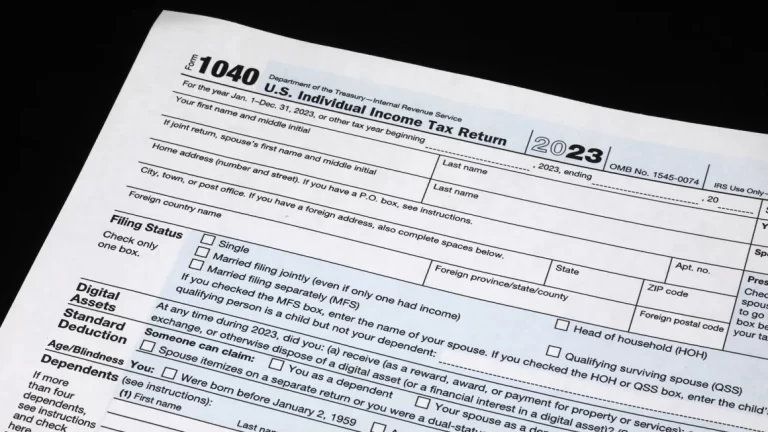If you haven’t filed your 2023 tax return with the IRS yet and you still owe income tax for last year, the good news is you still have time to rectify those situations before you’re penalized for failing to do so.
Most filers have until 11:59 pm Monday, April 15. Some, however, get an extra day or two if they live in Maine, Massachusetts or Washington, DC, due to observed holidays.
And others who live or work in federally declared disaster areas will have even more time both to file and pay thanks to IRS-granted extensions. The IRS has also given an extension to individuals and businesses affected by the October 7 terrorist attacks in Israel.
But if you are not in any of those situations, and you can’t file a full return by Monday, at the very least submit Form 4868 to get an automatic six-month extension to file. Keep in mind that this is only an extension to file your return and avoid a failure-to-file penalty. It is not an extension to pay whatever outstanding balance you owe. That amount is still due on April 15.
So, if you expect you still owe money, in addition to filing for an extension, send in a payment to the IRS by Monday that best approximates what you think is the amount due.
To get a reasonable estimate, look at your return from the prior year and figure out what, if anything, changed for you in 2023, said Tom O’Saben, director of tax content at the National Association of Tax Professionals. Think in terms of your sources of income (wages, dividends, interest, capital gains, rental income, taxable withdrawals from retirement accounts, etc.). Also consider any big life changes you’ve experienced like having a child or getting married or divorced, which may have tax implications for you.
But if all that is too complicated for you at the moment, O’Saben recommends at least doing a quick calculation to get a ballpark estimate of whether you owe more than what you’ve already paid the IRS for last year: “Multiply your [2023] income by 20% and make sure that you have already paid [that much],” he said. If you haven’t, then send in a payment making up the difference by Monday.
For some people making less than $200,000, the 20% calculation may overestimate your tax liability but that will protect you from getting hit with penalties, he said. If your household income is more than $200,000, however, it may underestimate what you owe and you’d be better off using 30% in your calculations.
The high cost of doing nothing by Monday
Failing to file on time when you still owe taxes will subject you to a failure-to-file penalty, which is based on how late your return is and the amount of your unpaid tax. Specifically, it will be 5% of your unpaid taxes for each month — or part of a month — that your return is late. The IRS notes, however, this penalty will not exceed 25% of your unpaid taxes.
If you don’t pay what you owe by your tax-filing deadline you will also be hit with a failure-to-pay penalty. That amounts to 0.5% of your outstanding balance every month or part of a month it goes unpaid. It, too, will not exceed 25% of the total.
If both a failure-to-file and a failure-to-pay penalty apply in the same month, you won’t be charged more than a total of 5% (4.5% for failure to file and 0.5% for failure to pay), according to the IRS.
Keep in mind, too, your outstanding balance will be subject to interest. That is why even if you can’t afford to pay what you owe in full by Monday, at least send in a partial payment to reduce the amount of penalties and interest that will accrue.
And read up on the different ways you can work out a repayment plan with the IRS, which may further limit your penalties and interest. If you owe a lot, it may be worth getting advice from an enrolled agent, certified public accountant or tax attorney who can represent you before the IRS to make sure you are choosing the best plan for your circumstances.
Special note for gig workers, freelancers and sole proprietors: Even if you file on time and pay all that you owe by April 15, you may be subject to an underpayment penalty if you either neglected to pay your estimated taxes quarterly throughout the year, or paid less than you owed in any given quarter.
What if you file late but are owed a refund?
If you’re a late filer who is owed a refund, in reality, you won’t be hit with a failure-to-file penalty if you miss your deadline.
“The fact of the matter is that these penalties only apply in circumstances where the taxpayer owes taxes, and they are not paid by the due date. If a taxpayer is due a refund, the April 15 date, in a practical sense, means nothing. The taxpayer can file their return for up to three years after the original due date and the IRS will not only issue their refund but will pay the taxpayer interest on the refund,” O’Saben said.
But do file within that time frame, he cautioned. “If you go beyond the three-year limit after the original due date, even if you are due a refund, you will no longer be entitled to it.”


